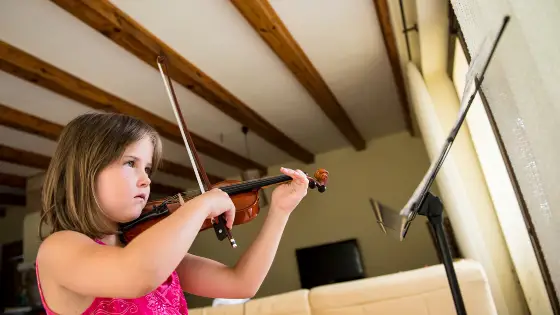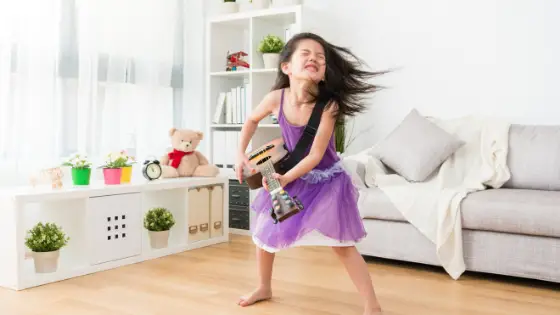As music teachers, one struggle we often face is motivating students to practice on a regular basis. Most students begin private lessons filled with enthusiasm and quickly learn every assignment you give them, but as time passes, practice slowly starts to fade. The teacher gets frustrated, the student gets frustrated…It all goes downhill from there. Unless you get them back on track, they will eventually quit. Motivating music students to practice is one of the biggest challenges we face as teachers but if you remain persistent and get a little creative, you can get your student back into the practice mindset.
Why students don’t practice
Your student comes into less after lesson with excuses like:
“I’ve been really busy this week.”
“I had a lot of homework this week.”
“I forgot to practice.”
I’m sure you have heard at least one of these excuses. If you have been teaching more than a few months, you have probably heard them all, so lets take a look at some of the reasons students may not be practicing.
They really are too busy
Many students today don’t just take music lessons. They have band class, orchestra, dance, soccer, basketball, cross country, cheer, scouts….and the list goes on.
Students spend on average 9.6 hours on after school activities Monday through Friday with private school students putting in about 20% more time than their public school counterparts. Between an 8 hour school day, extra-curricular activities, and homework, it’s no wonder children are struggling to find practice time…they are working over 50 hours a week!
While you can’t control how many activities each student does, you can discuss practice expectations with their parents and stress the importance of narrowing down their interest.
Parents pay too much or too little attention to practice
It is important to get parents involved in the practice of young students. Young children cannot be expected to remember to sit down and practice their instrument every day. Parental involvement in scheduling practice and helping the young student stay on task is paramount in their musical development.
But how much is too much?
Helicopter parents who hover over their child as they practice, constantly offering advice, nagging, and forcing practice on the child will only create frustration, resentment, and push back. If you are dealing with problematic parents, try sending home this handout to help parents motivate students to practice in a healthy way.
They get frustrated
When practice fails to result in the improvement the student desires, they often become frustrated. Frustrated students will often quit practicing altogether and will eventually quit lessons so it is important to consider the source of the student’s frustration. Identifying the source and addressing it head on will often result in students happily returning to a regular practice routine.
Why students get frustrated

They want results too fast
Learning how to play a musical instrument takes time and practice. In today’s age of instant gratification, many students expect quick results. Beginners see noticeable results relatively quickly but as students become more advanced, the results may not seem as clear to them.
If a student is not seeing the quick results they expect, it is easy for them to become frustrated. Learning a line from a method book can easily be done in a few days but learning a sonata can take weeks…or even months. Remind you student often that mastering a musical instrument is a marathon, not a 5K.
The pure focus on results rather than the practice is unhealthy and it is imperative to shift the focus in students early on. This can be done by helping the student set realistic goals using the SMART model and by focusing your praise as a teacher on the effort rather than the results.
Have more advanced students record themselves on week one of a new solo then have them record themselves again on week four. Ask them to compare the two recordings as part of their assignment. While the progress made seems slow to the student, by waiting four weeks for the second recording, they will hear a remarkable difference between the two.
They compare themselves to others
Students constantly compare themselves to their peers in general and those who compare their playing abilities to those of their peers can be left feeling inferior. Many factors go into how quickly a student progresses so comparing musical achievements between two different students is like comparing apples to oranges.
As teachers, it is important that we don’t add to this feeling of demoralization by comparing students in lessons. Each individual student has their own positive attributes and areas of weakness. If a student begins comparing themselves to another student, remind them of THEIR strengths.
Using dialogue such as “Yes, her scales are faster, but you play with such emotion and musicality” will positively reinforce the student’s strengths and begin to build up their confidence, motivating them to get back in the practice room.
They don’t know how to practice
As teachers we constantly tell our students to practice but how often do we actually sit down and tell them HOW to practice? If a student comes into their lesson for the third week in a row showing no improvement, try having a “practice lesson.”
Select a solo or etude that was previously assigned and have the student practice it in their lesson. Is the student actually working on the piece or simply playing through it? Show the student how to break the piece into sections and identify weak areas. Encourage repetition and the use of the metronome to speed sections up evenly.
Often, students want to practice but haven’t been given the skills to practice efficiently, making each practice session frustrating and keeping progress moving slowly.

Practice feels like an obstacle to overcome
Many students feel like practice is a chore. As teachers, we even feel like practice is a chore at times. Making practice feel like less of an obstacle can be approached from several different angles.
Younger students often benefit from incentive charts. Getting a sticker on their page for each item passed off is usually more than enough, but as students get older, overcoming that feeling of dread takes a little more effort.
Encouraging students to become involved in a competition such as honor band auditions or solo and ensemble festival may also motivate students to practice.
Finally, when all else fails, encourage students to just “get it over with.” Have students practice as soon as they get home from school. Once practice is over, they have the rest of the evening to do as they please.
Tips for getting your students to practice
As teachers, our job is to not only teach our students the music we work on in private lessons, but also teach them basic life skills such as time management, organization, self-motivation, and finally, how to actually practice for success.
Set practice times and expectations
Practice needs to become part of the students daily routine. Just like brushing their teeth or making their bed, practicing needs to become another daily habit.
Make sure you include the student’s input when you assign practice times and expectations. If a student thinks you are requiring them to practice a certain amount of time, you are likely to get push back, but if you include the student in the decision making process, they start to feel like they have some control and are more likely to actually meet the set expectations.
Consider a student’s age when setting practice expectations. Younger students will need to practice less than more advanced students since their attention span will be considerably shorter.
A lot can be achieved in as little as 10 – 15 minutes in younger students. Starting a young student off with five 10-15 minute daily practices each week will instill a habit that can slowly grow into 1-2 hour sessions as they get older.
Treat music like a reward
Students spend all day at school studying math, science, history, etc. and then come home to have additional homework in all of those subjects as well. When practice starts to feel more like homework than fun, the motivation to get the instrument out of the case or sit down at the piano starts to wane.
Rather than treating music like just another subject, encourage the student to see it not as something they HAVE to do, but as something they WANT to do. Once a student decides that playing their instrument is what they really want to do, they will make every effort to make time for it.
Encourage appropriate music
If the music assigned to a student is too easy, there is no need for them to spend much time practicing it, but if the assigned music is too difficult, students often get frustrated and give up.
There are a variety of reasons teachers assign music that is too difficult. If you live in a state that has leveled music, you may feel pressure to assign a Level 1 solo. The parent may be pushing for harder music, or the student may select a piece to play that is simply too difficult for them.
When choosing music for your students, you must keep both their ability level and best interest in mind. If a student is dead set on learning that concerto that you know is too difficult for them, let them, but also assign a more appropriate solo to work on as well. Let the student try their chosen solo and then use the easier piece as a backup.
Often students will find themselves practicing their backup piece more often because it is “more fun to play.”
Put the student in control
Students often feel like they are constantly told what to do. This especially applies to younger students. By including them in the decision making process when it comes to repertoire and assigned practice, you are more likely to have a student who loves to sit down and practice.
When choosing repertoire, select a few pieces and the play through the beginning of each one in a lesson. Allow the student to choose which solo they would like to work on. By allowing the student to choose their own solo from a short list of properly vetted solos of your choosing, the child feels more in control and will usually practice the piece that “they” chose.
The same thing applies to assigned practice time. Ask the student how much practice time they think they can fit in that week.
Use phrases such as “You know your schedule better than me. How much do you think you can realistically practice this week.” or “How many times do you think you should practice this week in order to learn this exercise.” Then guide the student by encouraging a little more or a little less practice.
Have them write the days in their lessons notebook and then check them off each day as they practice.
Use small rewards
Students, especially young students, love rewards. My mom used to teach third grade and used a “treasure chest” system to encourage good classroom behavior. Each time a student exhibited exemplary behavior they would get a ticket in their jar. Every friday, the treasure chest would open and the children could use their tickets to purchase merchandise from the treasure chest.
With private students, a treasure chest may not be practical (especially if you are a travel teacher) but I have found that stickers pretty much do the job. Students will do pretty much anything to get that sticker in their book.

Plan performances
It’s hard to stay motivated to practice each week without a little incentive. Even as professionals, we tend to slack off in the practice department when we don’t have an upcoming performance to prepare for, so how are we to expect our students to keep up diligent practice when it is even something we struggle with.
Planning performances for your students will encourage them to make time for practice simply because they now have motivation. Whether it is an audition, solo and ensemble, or a studio recital, students will sit down to practice more often when they know a performance is coming up.

Incorporate technology
Make practicing cool and fun by incorporating technology. It seems every kid these days has a smartphone, tablet, or computer, and most have all three! There are a variety of apps and websites that offer music theory flashcards, ear training games, or you can use something like Sight Reading Factory to encourage students to work on rhythms, sight reading, or ear training.
YouTube can be used to encourage students to listen to great performers on their instrument or you can have your student learn their favorite song by ear by listening to it online. Students can use this listening list to get started and keeping a listening journal will help encourage them to develop a good tonal concept.
Be their cheerleader
Students are constantly seeking validation so be their biggest cheerleader, but be sure to praise their effort not their talent.
If a student has been struggling with a particular rhythm or passage and they finally get it, celebrate! It may only be a measure of music but to the student they finally conquered Mount Everest! Celebrate ALL of their accomplishments!
Giving praise for their effort will motivate students to practice and encourage them to continue to work hard.
Eliminate distractions
It is sometimes difficult to know what a student’s practice set up at home looks like, but if you travel to their home or teach them online, you get a glimpse into their practice area. Does your student have a music stand? Is the family pet in the room? Does a younger sibling constantly interrupt or does a helicopter parent hover over them? Is there a window nearby for the student to look out?
Working with both the student and the parent on having the proper set up and eliminating unnecessary distractions will result in the student accomplishing more in each practice session, giving them faster results and therefore encouraging them to practice more often.
Change up how they practice
As human beings, most of us love routine, and any small change in our routine makes us feel uncomfortable. Some students however find a regular practice routine boring. Boredom results in practice being something the student is required to do rather than something they WANT to do.
Have them record themselves and then “be the teacher” by judging the performance and marking up a copy of their music with a red pen. Students can be brutal if given this role and will soon strive to make their own red markings go away.
Something as simple as switching up the order in which they practice their music can make all the difference in the world. Who says you have to practice your scales before your solo anyway? If they have an electric keyboard with programmable features, have them use a drumbeat in lieu of a metronome. Simple changes can make practice fun again.
Create challenges
Nothing can motivate a student like a little healthy competition. If you have a home studio, creating a scale challenge and using an incentive chart to allow your students to “compete” with each other can be a great motivator? Afterall, who doesn’t like getting stars next to their name.
You could also host a social media challenge. Something like post a photo of you practicing in the weirdest location you can find and post it to instagram. (Don’t forget to have them tag your studio page.)
Give students a scavenger hunt where they have to find certain musical selections on youtube, photos of their instruments on the internet, or an interesting fact about a performer or composer. All of these exercises will peak the students interest and break up their boredom.

Let them play music they like
Classical music is great but there are hundreds of different genres out there to be enjoyed. Mix up lessons from time to time by assigning a piece of popular music. Doing so keeps the student motivated and interested in practicing. Ask the student who their favorite band or singer is and then either find music for them to learn or have them learn a piece by ear.
Music stores often have books such as Disney classics, Star Wars, or music from Harry Potter. A lot of teachers brush these off as something for the students to work on in their own time but if you sit down and really look at them, these books often have rather difficult rhythms. Students will jump at the chance to play a song they know from time to time.
Lead by example
Students imitate what they see. If you have the opportunity, let the student hear you practicing when you walk into the room of post photos of yourself practicing on your social media. Students often want to be just like their teacher so setting a practice example for them will encourage them to follow in your footsteps.
Keep this in mind when you demonstrate anything in lessons. Make sure you are demonstrating good posture and proper hand position at all times and the student will quickly follow suit.
Get the parents on your side
When discussing practice with parents, emphasize the benefits of long term playing. Research shows that playing an instrument on a regular basis can increase IQ by up to seven points in both children and adults.
Studies also show that students who study music score an average of 20% higher on standardized tests.
Higher test scores will open the doors for students to get into the best colleges and universities and will often get them more scholarship money.
Participating in competitions and honor bands, orchestras and choirs makes a students college application appear more rounded, demonstrating that the student has good time management skills and consistently goes above and beyond what is required of them, and playing an instrument can also allow the student to audition to get additional scholarship for participating in the university music program.
Remember, every child is different
Always keep in mind that each student is different. What motivates one child may cause another to give pushback. Have patience and try a variety of motivation tactics until you find something that clicks with each individual student. Once a student finds practicing to be something they actually enjoy, their progress will be unstoppable!
Follow me on Instagram for more great content!

